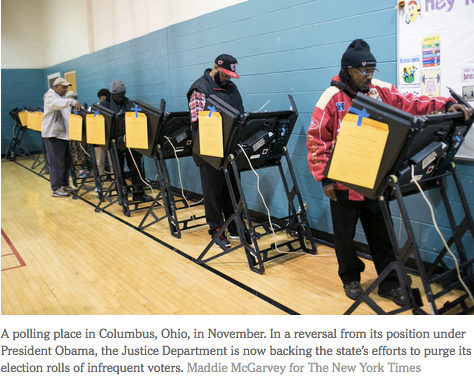WASHINGTON — The Justice Department has thrown its weight behind Ohio in a high-profile legal fight over the state’s purging of infrequent voters from its election rolls, reversing the federal government’s position under the Obama administration that the practice was unlawful.
The move was the latest in a series of changes the department has made in how it enforces civil rights law under the Trump administration. The dispute centers on an aggressive practice used in Ohio, a crucial swing state in presidential elections, that removes voters who sit out three election cycles and fail to respond to a warning.
Last year, when the state sought to delete several hundred thousand registrations of infrequent voters ahead of the presidential election, civil-liberties groups filed a lawsuit against Ohio’s secretary of state, Jon Husted. After the Obama-era Justice Department filed a friend-of-the-court brief calling the purging practices unlawful, a federal appeals court ordered Ohio to let those people vote.
. . .
Kristen Clarke, the president of the liberal Lawyers’ Committee for Civil Rights Under Law, condemned the new position as an effort to obstruct voting rights that could open the door to “wide-scale unlawful purging.” She also called the reversal “just the latest example of an agency whose leadership has lost its moral compass.”
The civil rights division has been at the center of culture-war fighting in recent decades when Republican and Democratic administrations take over from each other. Under the Trump administration, it has taken steps this year that push the agency in a more conservative direction.
This year, the department switched its position in a lawsuit challenging Texas’ strict voter identification law, dropping the claim that the law was intentionally discriminatory and later declaring that the law had been fixed.
It has backed off using consent decrees to impose reforms on troubled police departments. It has urged an appeals court not to interpret the ban on sex-based discrimination in the Civil Rights Act of 1964 as covering sexual orientation.
And it is now asking division lawyers to volunteer for a special project taking on affirmative action practices in college and university admissions that try to maintain diversity in student bodies. The department has said that project is looking at a complaint filed in 2015 about Harvard University on behalf of Asian-American applicants.
Partners in Voter Suppression
The Trump administration moved deeper into the politics of voter suppression this week by reversing the federal government’s opposition to Ohio’s effort to purge tens of thousands of voters from the rolls simply because they vote infrequently.
A federal appeals court blocked Ohio’s move last year as a violation of voting laws, in a case brought by civil rights advocates and backed by the Obama administration’s Department of Justice. Now that an appeal has been accepted for this term by the Supreme Court, Trump appointees at Justice — not career professionals — have changed the government’s position to side with Ohio, in effect endorsing the purge and asking that it be allowed to go forward.
The case is a major challenge to the National Voter Registration Act of 1993 and the Help America Vote Act of 2002, which require states to update rolls by deleting voters who move away, but bar the states from deregistering people simply because of voting inactivity.




